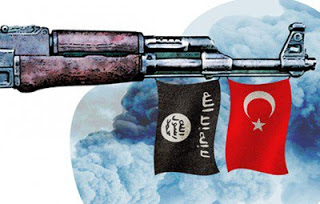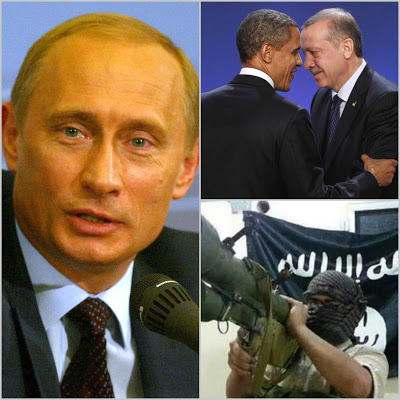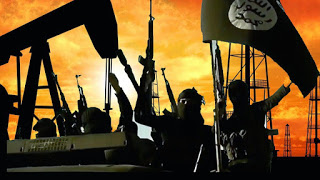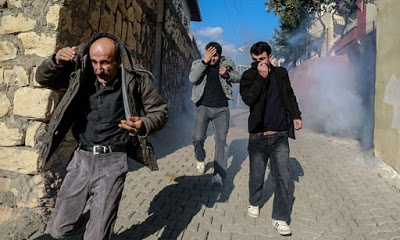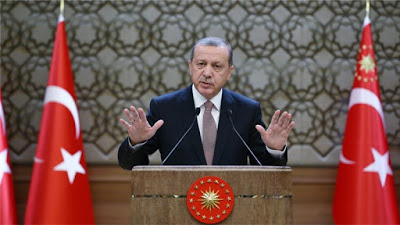 |
| Erdogan denies proven oil links with Isis |
ISIS to the Kurds
Vladimir Putin that Turkey was actively complicit in buying oil from ISIS President
Erdogan challenged him to prove it and if he couldn’t to stand down.
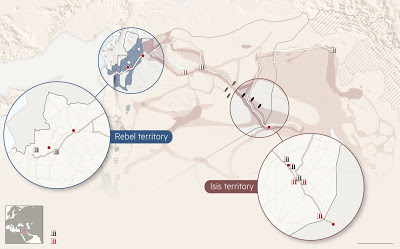 |
| The ISIS – Turkey oil route |
Putin could prove it.
will resign but the evidence is quite clear.
Below is the response of the Russian Government to the challenge thrown down by Erdogan.
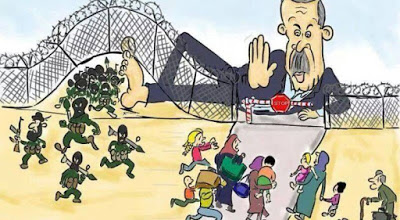 |
| Erdogan keeps out the oil |
relationship hinted at by Russian leader after warplane was shot down is a
complex one, and includes links between senior Isis figures and Turkish
officials
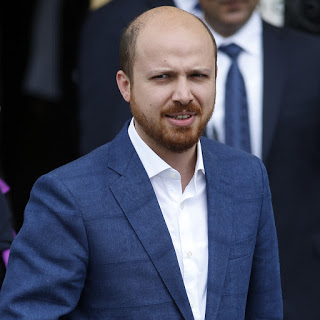 |
| Bilal Erdogan – in charge of the oil trade with ISIS |
Since the earliest months of the Syrian war, Turkey has had more direct involvement and
more at stake than any of the regional states lined up against Bashar al-Assad.
Turkish borders have been the primary thoroughfare for fighters of all kinds
to enter Syria. Its
military bases have been used to distribute weapons and to train rebel
fighters. And its frontier towns and villages have taken in almost one million
refugees.
Turkey’s international airports have also been busy. Many, if not most, of
the estimated 15,000-20,000 foreign fighters to have joined Islamic State (Isis) have first flown into
Istanbul or Adana, or arrived by ferry along its Mediterranean coast.
The influx has offered fertile ground to allies of Assad who, well before a
Turkish jet shot down a Russian fighter on Tuesday, had claimed Turkey had
enabled or even supported Isis. Vladimir Putin’s
reference to Turkey as “accomplices of terrorists” is likely to resonate
even among some of Ankara’s backers.
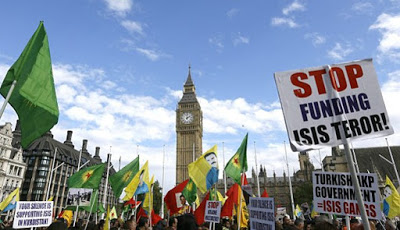 |
| Protest in Parliament Square |
From
midway through 2012, when jihadis started to travel to Syria, their presence
was apparent at all points of the journey to the border: at Istanbul airport,
in the southern cities of Hatay and Gaziantep – both of which were staging
points – and in the border villages. Foreigners on their way to fight remained
fixtures on these routes until late in 2014 when, after continued pressure from
the EU states and the US, coordinated efforts were made to turn them back.
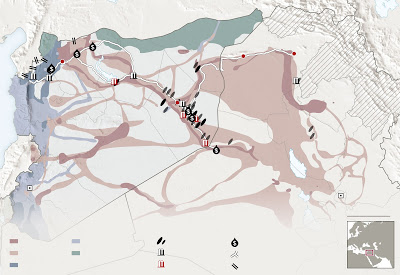 |
| Syrian oil map – the ourney of a barrel |
By then, Isis had become a dominant presence in parts of north and east
Syria. It had splintered non-ideological factions of the Syrian opposition as
well as Islamist groups, both of which had been backed by Turkey, and ensured
that whatever form of governance that emerged from Syria’s ruins would have
little to do with the revolution’s original goals.
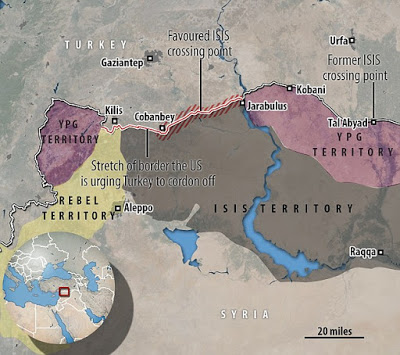 |
| Turkey shot down Russian aircraft to protect oil supplies |
The steady stream of foreigners who passed through Hatay and Gaziantep made
little effort to remain discreet, gathering regularly in local hotels, coffee
shops and bus stations. European diplomats alarmed by the gathering threat
concluded that the Turkish leadership was sympathetic to conservative Islamists
travelling to fight Assad, who had, until his brutal response to
pro-democracy demonstrations in 2011, been a friend of the Turkish
president, Recep Tayyip Erdoğan. “After that he became an enemy,” said one
western official. “Erdoğan had tried to mentor Assad. But after the crackdown
[on demonstrations] he felt insulted by him. And we are where we are today.”
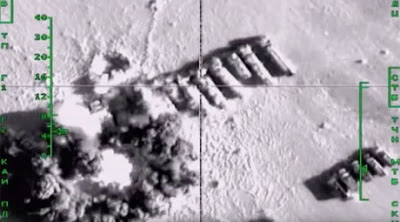 |
| ‘Commercial scale’ oil smuggling into Turkey becomes priority target of anti-ISIS strikes. “ |
As Syria unravelled, Turkey doubled down on its commitment to a range of
militant groups, while at the same time appearing to recognise that the jihadis
who had passed through their territory were hardly a benign threat. The change
in the dialogue with western officials was marked: security officials no longer
insisted on the extremists being called “those who abuse religion”. Labelling
them “terrorists” in official correspondence was no longer the problem it had
been.
Despite
that, links to some aspects of Isis continued to develop. Turkish businessmen
struck lucrative deals with Isis oil smugglers, adding at least $10m (£6.6m)
per week to the terror group’s coffers, and replacing the Syrian regime as its
main client. Over the past two years several senior Isis members have told the
Guardian that Turkey preferred to stay out of their way and rarely tackled them
directly.
Concerns continued to grow in intelligence circles that the links eclipsed
the mantra that “my enemy’s enemy is my friend” and could no longer be
explained away as an alliance of convenience. Those fears grew in May this year
after a US special forces
raid in eastern Syria, which killed the Isis official responsible for the
oil trade, Abu Sayyaf.
A trawl through Sayyaf’s compound uncovered hard drives that detailed
connections between senior Isis figures and some Turkish officials. Missives
were sent to Washington and London warning that the discovery had “urgent
policy implications”.
Shortly
after that, Turkey opened a new front against the Kurdish separatist group, the
PKK, with which it had fought an internecine war for close to 40 years. In
doing so, it allowed the US to begin using its Incirlik air base for operations
against Isis, pledging that it too would join the fray. Ever since, Turkey’s
jets have aimed their missiles almost exclusively at PKK targets inside its
borders and in Syria, where the YPG, a military ally of the PKK, has been the
only effective fighting force against Isis – while acting under the cover of US
fighter jets.
Senior Turkish officials have openly stated that the Kurds – the main US
ally in Syria – pose more of a threat than Isis to Turkey’s national interests.
Yet, through it all, Turkey, a Nato member, continues to be regarded as an ally
by Europe. The
US and Britain have become far less enamoured, but are unwilling to do much
about it. The worry in both capitals is that to do so would introduce yet
another variable into an already highly volatile region, where alliances,
strategies, and implications are constantly changing.
“Turkey thought they could control it all,” said one senior western
official. “But it got out of their hands. It has come back to bite them in the
heart of Ankara [a double suicide bombing in October that was claimed by Isis]
and it will haunt them for a long time.”
Turkey could cut off Islamic State’s supply lines. So why doesn’t it?
Western leaders could destroy Islamic State by calling on Erdoğan to end his
attacks on Kurdish forces in Syria and Turkey and allow them to fight Isis on
the ground
In the wake of the murderous attacks in Paris,
we can expect western heads of state to do what they always do in such
circumstances: declare total and unremitting war on those who brought it about.
They don’t actually mean it. They’ve had the means to uproot and destroy
Islamic State within their hands for over a year now. They’ve simply refused to
make use of it. In fact, as the world watched leaders making statements of
implacable resolve at the G20 summit in
Antalaya, these same leaders are hobnobbing with Turkey’s president Recep Tayyip Erdoğan,
a man whose tacit political, economic, and even military support contributed to
Isis’s ability to perpetrate the atrocities in Paris, not to mention an endless
stream of atrocities inside the Middle East.
How
could Isis be eliminated? In the region, everyone knows. All it would really
take would be to unleash the largely Kurdish forces of the YPG (Democratic
Union party) in Syria, and PKK (Kurdistan Workers’ party) guerillas in Iraq and
Turkey. These are, currently, the main forces actually fighting Isis on the
ground. They have proved extraordinarily
militarily effective and oppose every aspect of Isis’s reactionary
ideology.
But instead, YPG-controlled territory in Syria finds itself placed under a
total embargo by Turkey, and
PKK forces are under continual bombardment by the Turkish air force. Not only
has Erdoğan done almost everything he can to cripple the forces actually
fighting Isis; there is considerable evidence that his government has been at
least tacitly aiding Isis itself.
It might seem outrageous to suggest that a Nato member like Turkey would in
any way support an organisation that murders western civilians in cold blood.
That would be like a Nato member supporting al-Qaida. But in fact there is
reason to believe that Erdoğan’s government does support the
Syrian branch of al-Qaida (Jabhat al-Nusra) too, along with any number of
other rebel groups that share its conservative Islamist ideology. The Institute
for the Study of Human Rights at Columbia University has compiled a long list
of evidence of Turkish support for Isis in Syria.
How
has Erdoğan got away with this? Mainly by claiming those fighting Isis are
‘terrorists’ themselves
And
then there are Erdoğan’s actual, stated positions. Back in August, the YPG,
fresh from their victories in Kobani and Gire
Spi, were poised to seize Jarablus, the last Isis-held town on the Turkish border that the terror
organisation had been using to resupply its capital in Raqqa with weapons,
materials, and recruits – Isis supply lines pass directly through Turkey.
Commentators predicted that with Jarablus gone, Raqqa would soon follow. Erdoğan reacted by
declaring Jarablus a “red line”: if the Kurds attacked, his forces would
intervene militarily – against the YPG. So Jarablus remains in terrorist hands
to this day, under de facto Turkish military protection.
How has Erdoğan got away with this? Mainly by claiming those fighting Isis
are “terrorists” themselves. It is true that the PKK did fight a sometimes ugly
guerilla war with Turkey in the 1990s, which resulted in it being placed on the
international terror list. For the last 10 years, however, it has completely
shifted strategy, renouncing separatism and adopting a strict policy of never
harming civilians. The PKK was responsible for rescuing thousands of Yazidi civilians
threatened with genocide by Isis in 2014, and its sister organisation, the YPG,
of protecting Christian communities in Syria as well. Their strategy focuses on
pursuing peace talks with the government, while encouraging local democratic
autonomy in Kurdish areas under the aegis of the HDP, originally a nationalist
political party, which has reinvented itself as a voice of a pan-Turkish
democratic left.
They have proved extraordinarily militarily effective and with their embrace
of grassroots democracy and women’s rights, oppose every aspect of Isis’
reactionary ideology. In June, HDP success at the
polls denied Erdoğan his parliamentary majority. Erdoğan’s response was
ingenious. He called for new elections,
declared he was “going to war” with Isis, made one token symbolic attack on
them and then proceeded to unleash the full force of his military against PKK
forces in Turkey and Iraq, while denouncing the HDP as “terrorist supporters”
for their association with them.
There followed a series of increasingly bloody terrorist bombings inside
Turkey – in the cities of Diyarbakir, Suruc, and, finally, Ankara – attacks
attributed to Isis but which, for some mysterious reason, only ever seemed to
target civilian activists
associated with the HDP. Victims have repeatedly reported police preventing ambulances evacuating the wounded,
or even opening fire on survivors with tear gas.
As
a result, the HDP gave up even holding political rallies in the weeks leading
up to new elections in November for fear of mass murder, and enough HDP voters
failed to show up at the polls that Erdoğan’s party secured a majority in
parliament.
The exact relationship between Erdoğan’s government and Isis may be subject
to debate; but of some things we can be relatively certain. Had Turkey placed
the same kind of absolute blockade on Isis territories as they did on
Kurdish-held parts of Syria, let alone shown the same sort of “benign neglect”
towards the PKK and YPG that they have been offering to Isis, that
blood-stained “caliphate” would long since have collapsed – and
arguably, the Paris attacks may never have happened. And if Turkey were to do
the same today, Isis would probably collapse in a matter of months. Yet, has a
single western leader called on Erdoğan to do this?
The next time you hear one of those politicians declaring the need to crack
down on civil liberties or immigrant rights because of the need for absolute
“war” against terrorism bear all this in mind. Their resolve is exactly as
“absolute” as it is politically convenient. Turkey, after all, is a “strategic
ally”. So after their declaration, they are likely to head off to share a
friendly cup of tea with the very man who makes it possible for Isis to
continue to exist.
